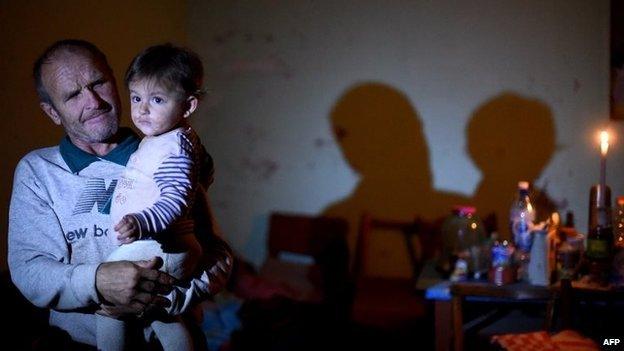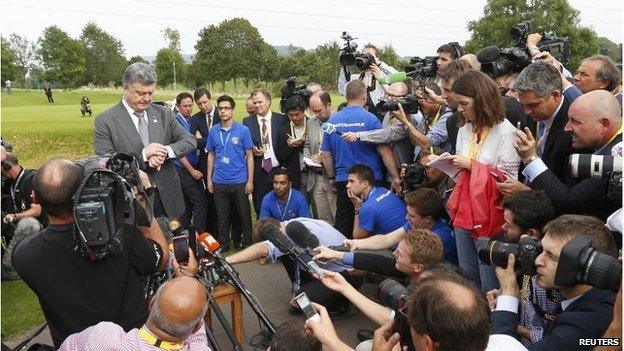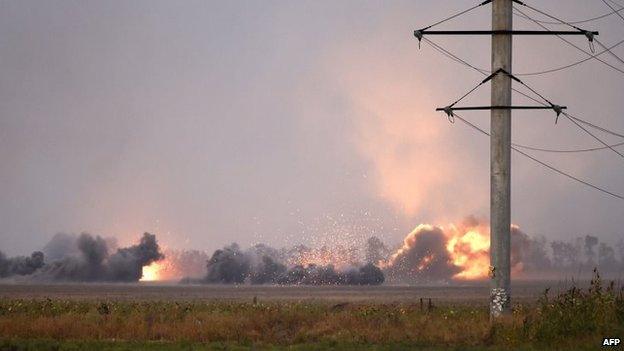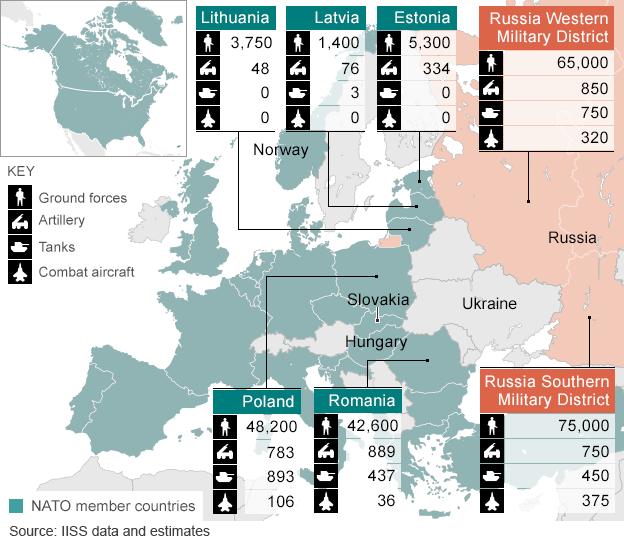Ukraine and pro-Russia rebels sign ceasefire deal
- Published
Petro Poroshenko: "It is very important that this ceasefire lasts long and that during this ceasefire we continue political dialogue to find peace and stability"
Ukraine and pro-Russian rebels in the east have signed a truce deal to end almost five months of fighting.
The two sides agreed to stop firing by 15:00 GMT and the truce appeared to be holding. But the rebels said the truce had not changed their policy of advocating splitting from Ukraine.
Meanwhile EU ambassadors have expanded, external a list of Russian and pro-Russian individuals targeted by sanctions.
More than 2,600 people have died since rebels stormed several eastern cities.
The takeover - which followed the annexation by Russia of the southern Crimea peninsula in March - prompted a military operation by Ukrainian forces to retake the cities.
The rebels, who had largely been pushed back towards their strongholds of Donetsk and Luhansk, made new advances in recent days.

Residents around Donetsk have been taking shelter in schools and other buildings for weeks

Petro Poroshenko welcomed the ceasefire during a news conference at the Nato summit in Wales
Earlier in the day, fighting was reported around Donetsk and Mariupol, a coastal city about 110km (70 miles) to the south.
Witnesses said three large explosions were heard in Donetsk just before the ceasefire came into force.

At the scene: Fergal Keane, BBC News in Mariupol
As Fergal Keane reports, casualties continued in Ukraine in the hours before the ceasefire
There are rumours that Ukrainian battle tanks have pulled back from the eastern edge of the city. The rebels are holding their positions outside Mariupol.
It is all in dramatic contrast to the day's beginning. Before dawn I was woken by the noise of explosions as government and pro-Russian forces fought an artillery duel.
The sound of rockets, air strikes and mortars continued to be heard throughout the morning. Large plumes of smoke dotted the fields around the east of the city.
One of those explosions claimed the lives of Lubov Vasylivna's grandchildren: 10-year-old Nikita, who was disabled, and his six-year-old sister, Karolina.
They died just hours before the ceasefire came into effect. "I don't know how I am going to survive this," Lubov told me. "The images of them are in front of my eyes."


Cities such as Mariupol have been the scene of fierce fighting in the past few days
But later reports suggested fighting in both cities and elsewhere in the region had subsided.
The West accuses Russia of sending arms and troops to back the rebels in eastern Ukraine - allegations denied by Russia.

The ceasefire talks in Minsk, Belarus, were brokered by the Organization for Security and Cooperation in Europe (OSCE), and involved a former Ukrainian president, leaders of the pro-Russian rebels, and a Russian delegate.
Both sides agreed to stop fighting, and the OSCE said it would monitor the ceasefire. However, the full agreement has not been published.
President Petro Poroshenko said the ceasefire was based on a 12-point peace plan that included the release of "hostages", which he said would probably happen on Saturday.
"It is very important that this ceasefire lasts long, and during this ceasefire we continue the political dialogue to bring peace and stability," he said.
"The only reason that we're seeing this ceasefire... is because of both the sanctions that have already been applied and the threat of further sanctions"
Russian President Vladimir Putin had been told of the plan during a phone call, he added.
In another development, Nato agreed to form a multi-national "spearhead" force capable of deploying within 48 hours.
At the close of a two-day summit in Wales, Nato chief Anders Fogh Rasmussen said Russia's actions in Ukraine had been a wake-up call for the alliance, and had spurred the formation of the rapid-reaction force.
He welcomed the ceasefire, saying he hoped it "could be the start of a constructive political process".
However, Russia's foreign ministry reacted angrily to Nato's announcements.
"The essence and tone of [Nato] statements on the Ukraine situation, and the plans announced to hold joint Nato exercises with Kiev on the territory of that country before the end of 2014, will inevitably lead to heightened tension," a statement said.
"They risk wrecking the progress made in the peace process in Ukraine, and encourage a deepening of the split in Ukrainian society."
Sanctions
European Commission President Jose Manuel Barroso said in a statement on Friday that the EU had expanded the list of persons under an EU asset freeze and travel ban to include the new leadership in eastern Ukraine, the Crimean government and Russian decision-makers and oligarchs.
The sanctions are due to be formally adopted on Monday. However, diplomats quoted by Reuters said the measures could be suspended if the ceasefire held and if Moscow withdrew forces from Ukraine.
Earlier, US President Barack Obama said the ceasefire had been agreed because of sanctions imposed on Russia.
Measures against Russia would be reviewed in line with the implementation of the ceasefire, which he said would be a very long process.